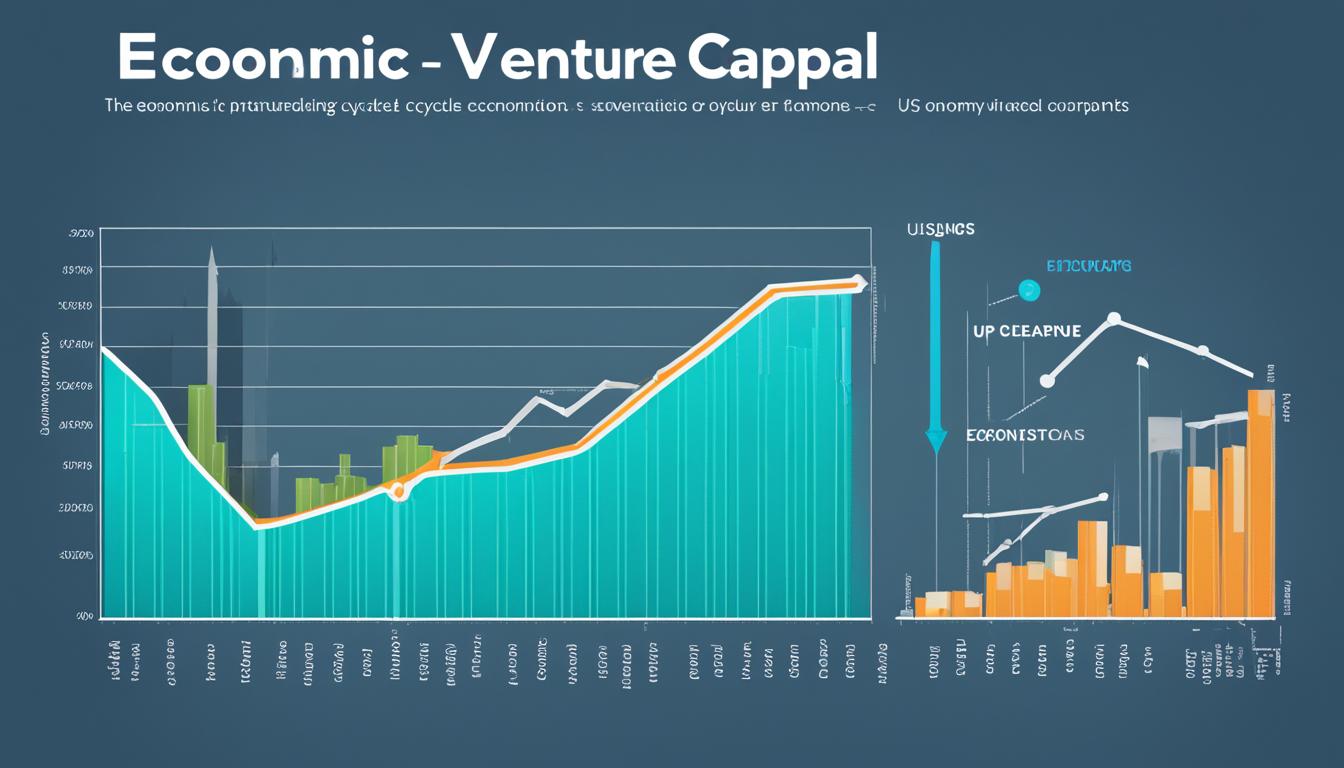In the ever-evolving world of business, the relationship between economic cycles and venture capital investment is a fascinating dynamic that warrants closer examination. How do the ebb and flow of the business cycles influence the decisions and strategies of venture capitalists? This intriguing question lies at the heart of our exploration, as we delve into the complexities of this symbiotic relationship.
Economic cycles, consisting of periods of expansion and contraction, can have a significant impact on the venture capital industry. During economic expansions, venture capitalists may be more willing to take on higher-risk investments, as they see greater opportunities for growth and innovation. Conversely, during economic contractions, venture capitalists may become more conservative in their investment strategies, focusing on more established companies and seeking safer, less risky investments.
Understanding the nuances of this dynamic is crucial for entrepreneurs, investors, and policymakers alike. By delving into the impact of economic cycles on venture capital, we can gain valuable insights that can inform decision-making and help navigate the ever-changing business environment.
Key Takeaways
- Economic cycles, including periods of expansion and contraction, can significantly impact the venture capital industry.
- During economic expansions, venture capitalists may be more willing to take on higher-risk investments, seeking growth and innovation.
- In economic contractions, venture capitalists tend to adopt a more conservative investment approach, focusing on established companies and safer investments.
- Understanding the relationship between economic cycles and venture capital investment is crucial for entrepreneurs, investors, and policymakers.
- Navigating the ups and downs of the business environment requires strategic decision-making and adapting to the changing economic landscape.
Understanding Economic Cycles
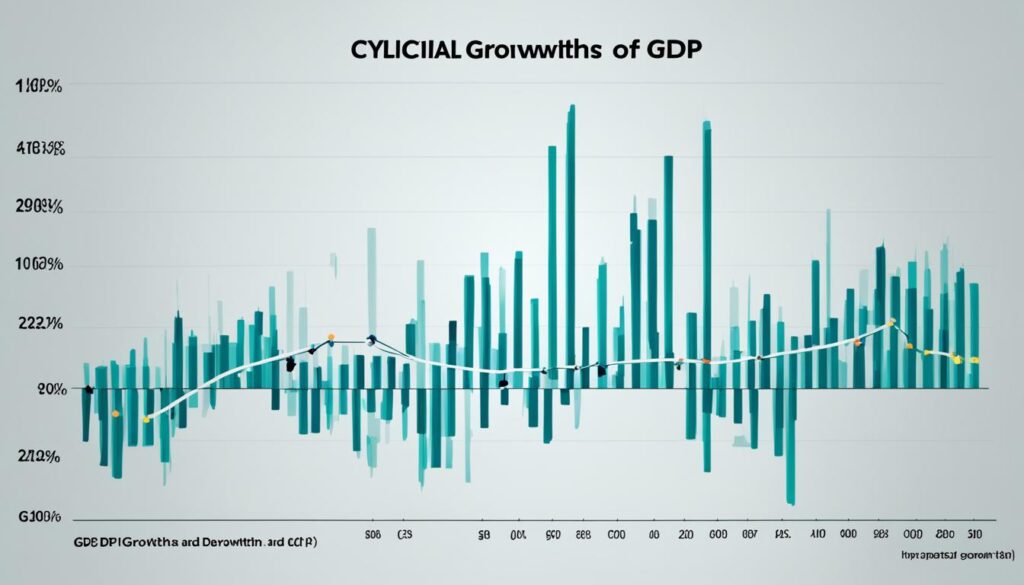
Economic cycles refer to the fluctuations in economic activity over time, characterized by periods of expansion and contraction. These cycles play a crucial role in the venture capital investment landscape, as they can significantly impact the risk appetite and decision-making of investors.
Phases of the Business Cycle
The business cycle typically consists of four distinct phases: expansion, peak, contraction, and trough. During the expansion phase, the economy experiences growth, with increased consumer spending, business investment, and employment. The peak phase represents the highest point of the cycle, while the contraction phase signifies a slowdown or recession. The trough marks the lowest point of the cycle, before the cycle begins to expand again.
Indicators of Economic Cycles
A variety of economic indicators are used to gauge the state of the economic cycles and predict future trends. These include measures such as gross domestic product (GDP), unemployment rates, inflation, and consumer spending. By closely monitoring these economic indicators, venture capitalists and startups can anticipate changes in the investment landscape and adjust their venture capital investment strategies accordingly.
Understanding the dynamics of the business cycle phases and the relevant economic indicators is crucial for venture capitalists and startups navigating the ever-changing economic environment. This knowledge can inform decision-making, risk management, and the alignment of investment strategies with the prevailing market conditions.
The Role of Venture Capital
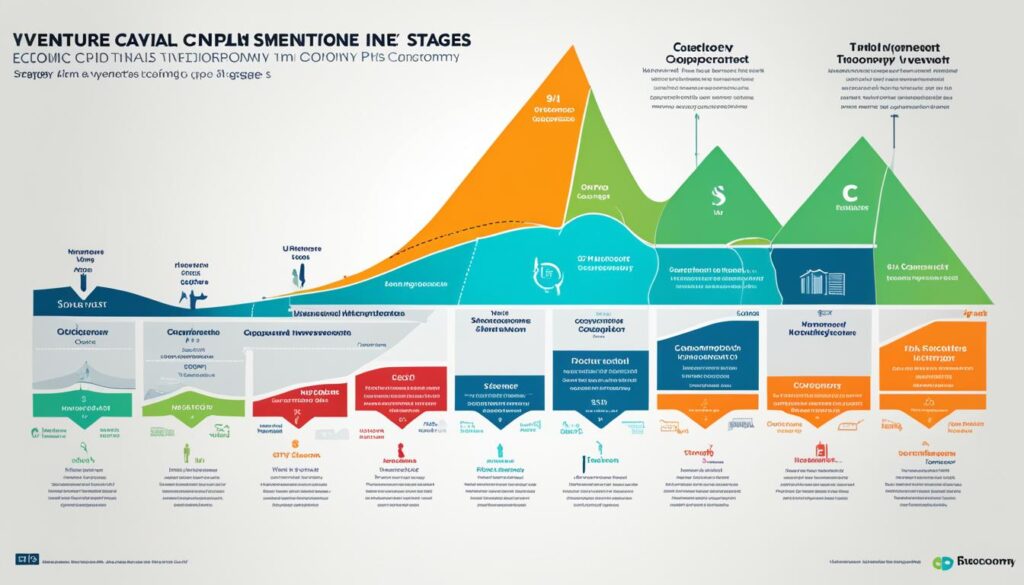
The venture capital industry plays a crucial role in the growth and development of startups and early-stage companies. Venture capital refers to the financing provided by investors to these high-potential businesses, with the goal of generating significant returns on their investments.
What Is Venture Capital?
Venture capitalists typically invest in companies that are in the seed, early, or expansion stages of their development. This investment process involves several key stages, including the initial screening of potential investments, thorough due diligence, negotiation of investment terms, and ongoing monitoring and support of portfolio companies.
Venture Capital Investment Stages
The venture capital investment process is often divided into distinct stages, each with its own unique characteristics and objectives:
- Seed Stage: Venture capitalists provide early-stage funding to startups with innovative ideas and prototypes, helping them to develop their products and establish their business models.
- Early Stage: At this stage, venture capitalists invest in companies that have demonstrated initial traction, such as generating revenue or securing a customer base, with the goal of helping them scale and grow their operations.
- Expansion Stage: Venture capitalists may provide later-stage funding to companies that have already achieved significant growth and are looking to expand into new markets, launch new products, or acquire competitors.
By understanding the various venture capital investment stages, entrepreneurs and startups can better navigate the funding landscape and identify the most appropriate sources of capital to support their business goals.
What is the impact of economic cycles on venture capital

Economic cycles can have a significant impact on the venture capital industry. During periods of economic expansion, venture capitalists may be more willing to take on higher-risk investments, as they see greater opportunities for growth and innovation. Conversely, during economic contractions, venture capitalists may become more conservative in their investment strategies, focusing on more established companies and seeking safer, less risky investments. This shift in risk appetite can have a significant impact on the types of companies that receive funding, the valuation of startups, and the overall investment landscape for entrepreneurs and investors.
The impact of economic cycles on venture capital investment is a crucial consideration for startups, investors, and policymakers. By understanding these dynamics, they can better navigate the ever-changing business environment and make informed decisions to support innovation and growth, even during challenging economic times.
Investing During Economic Expansions

During periods of economic expansion, venture capitalists tend to have a greater risk appetite, as they see increased opportunities for growth and innovation. This can lead to a surge in funding for startups and early-stage companies, particularly those with innovative ideas and disruptive technologies. Venture capitalists may be more willing to invest in riskier, high-potential ventures, as they anticipate greater returns during times of economic growth. This favorable environment can create a welcoming landscape for entrepreneurs seeking funding to bring their groundbreaking ideas to market.
Increased Risk Appetite
When the economy is expanding, venture capitalists often exhibit a heightened risk appetite, as they believe the potential rewards outweigh the inherent risks. This shift in mindset can result in increased funding for venture capital investing during economic expansions, with investors more willing to take on higher-risk, higher-reward opportunities.
Funding Innovative Ideas
The combination of an expanded risk appetite and a robust economic climate can create a fertile ground for funding innovative ideas in the startup ecosystem. Venture capitalists may be more inclined to invest in disruptive technologies, novel business models, and ambitious entrepreneurs who have the potential to capitalize on the growth opportunities presented during economic expansions.
Investing During Economic Contractions
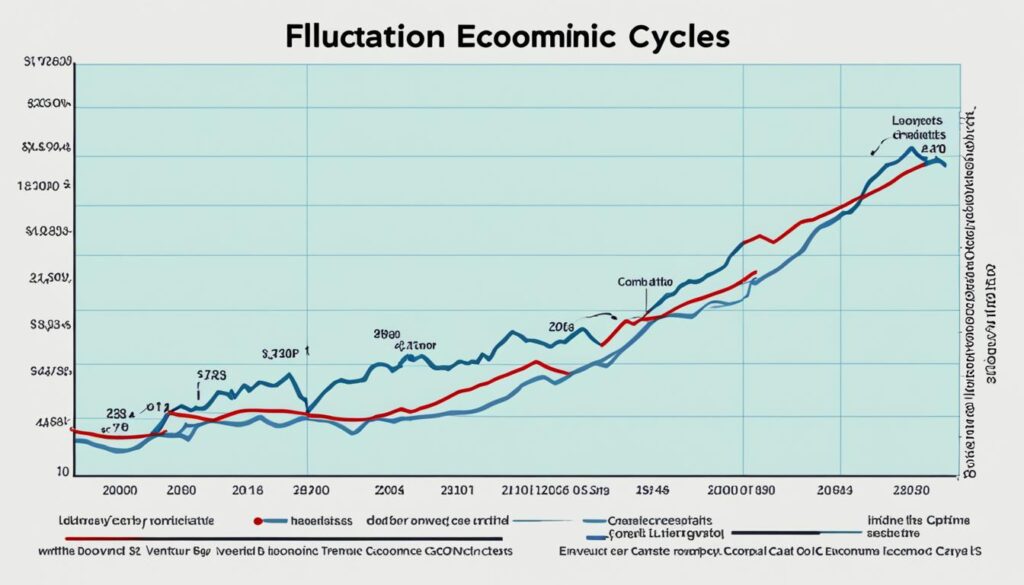
In contrast to the opportunistic mindset during economic expansions, venture capitalists tend to adopt a more conservative investment approach when economic contractions or recessions loom. They may become more cautious in their decision-making, focusing their attention on more established companies with proven track records and lower-risk profiles. This shift in risk appetite can make it increasingly challenging for startups and early-stage companies to secure the necessary funding, as venture capitalists may be less inclined to take on higher-risk investments during these uncertain times.
However, economic contractions can also present opportunities for value investments for savvy venture capitalists. By carefully analyzing the market and identifying undervalued companies or assets that have the potential for strong returns in the long run, venture capitalists can strategically deploy their capital to capitalize on these rare occasions. This conservative, value-driven investment strategy can help venture capital firms weather the storm of economic downturns and position themselves for future growth and success.
The ability to navigate the complexities of venture capital investing during economic contractions is a hallmark of experienced and well-versed investment professionals. By striking a balance between cautious risk management and the pursuit of promising value opportunities, venture capitalists can not only protect their portfolios but also uncover innovative companies that may thrive even in challenging economic environments.
Impact on Startup Funding

The impact of economic cycles on venture capital investment can have significant implications for startup funding. During economic expansions, startups may find it easier to secure funding, as venture capitalists are more willing to take on higher-risk investments. However, during economic contractions or recessions, startups may face greater challenges in accessing capital, as venture capitalists become more conservative in their investment strategies. This can lead to funding shortages and make it harder for startups to grow and scale their businesses.
Funding Challenges in Recessions
During tight credit cycles, venture capital funding can become scarce for startups. Limited partners (LPs) might face reduced liquidity, impacting their ability to allocate capital to VC funds. Additionally, LPs could become more risk-averse, possibly choosing safer assets over VC funds, and might need to hold a larger portion of assets in liquid form, limiting their commitment to venture capital. These factors can make fundraising harder for VC fund managers, who may need to shift their investment strategies to focus more on supporting existing portfolio companies rather than making new investments.
Opportunities for Disruptive Startups
Despite the funding challenges faced by startups during economic contractions, these periods can also present opportunities for disruptive startups. By capitalizing on new market needs or inefficiencies in incumbent industries, startups with innovative solutions may be able to thrive, even in a more conservative investment landscape. Venture capitalists who are able to identify these disruptive opportunities and provide the necessary funding may find significant returns on their investments, even during times of economic uncertainty.
Venture Capital Strategies Across Cycles
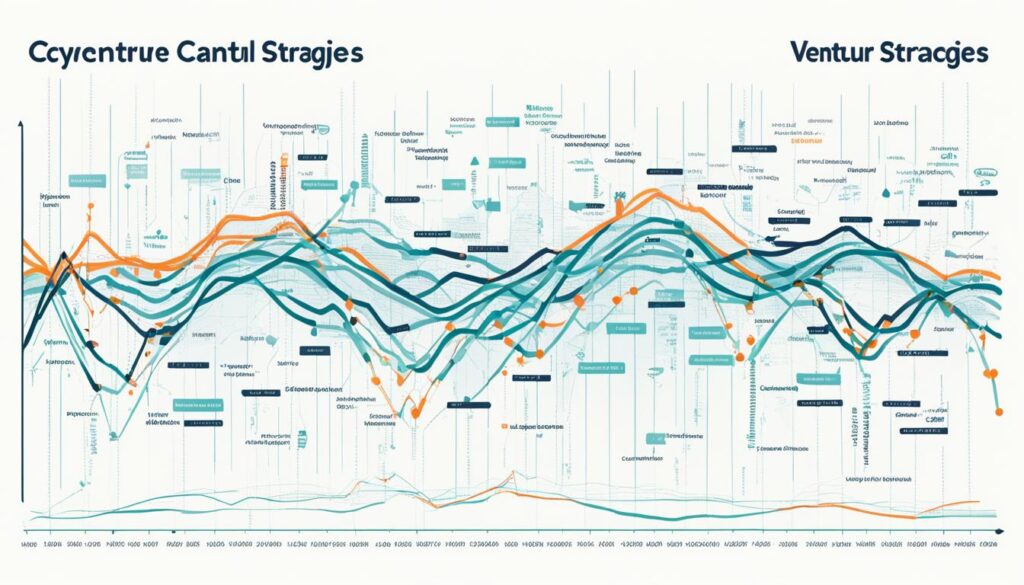
Successful venture capital firms often employ various strategies to navigate the ups and downs of economic cycles. One key strategy is diversification, which involves investing in a portfolio of startups and companies across different sectors and stages of development. This helps to manage risk and ensure that the venture capital firm’s returns are not overly dependent on the performance of any single investment.
Diversification and Risk Management
By diversifying their portfolios, venture capital firms can mitigate the impact of economic downturns on their overall performance. This approach allows them to spread their investments across a range of industries and development stages, reducing their exposure to the volatility inherent in any particular sector or stage. Effectively managing risk through diversification is a crucial strategy for venture capital firms looking to weather the economic cycles.
Sector-Specific Investing
In addition to diversification, some venture capital firms may adopt a sector-specific investing approach. These firms focus on particular industries or technologies that they believe have the greatest potential for growth and innovation, regardless of the broader economic conditions. By specializing in certain sectors, these venture capital firms can leverage their deep industry knowledge and networks to identify promising investment opportunities, even during economic contractions. This sector-specific focus can be a valuable strategy for venture capital firms seeking to generate consistent returns across economic cycles.
As venture capital firms navigate the dynamic economic landscape, a combination of diversification and sector-specific investing can be a powerful approach to managing risk and capitalizing on emerging opportunities. By employing these strategies, successful venture capital firms are better equipped to weather the storms of economic cycles and continue supporting the growth and innovation of their portfolio companies.
Government Policies and Venture Capital

The venture capital industry is not insulated from the influence of government policies and regulations. The regulatory environment surrounding investment activities can significantly impact the risk appetite and investment strategies of venture capitalists. Additionally, government incentives and support programs, such as tax credits, grants, or public-private partnerships, can play a crucial role in encouraging venture capital investment, particularly during economic downturns.
Regulatory Environment
Laws and regulations governing the venture capital industry can shape the investment landscape. Policymakers must strike a delicate balance between fostering an environment that promotes innovation and entrepreneurship, while also ensuring appropriate safeguards are in place to protect investors and the broader financial system. Research has shown that a well-designed regulatory framework can have a positive impact on the performance of entrepreneurial ventures, particularly when it avoids excessive control over business decisions.
Incentives and Support Programs
Governments around the world have implemented a range of incentives and support programs to encourage venture capital investment. These initiatives can include tax credits, grants, co-investment schemes, and public-private partnerships. By providing these forms of support, policymakers aim to stimulate entrepreneurship, foster innovation, and drive economic growth. However, it is important to strike the right balance, as high levels of government control over venture capital firms can be associated with weaker performance outcomes.
By understanding the interplay between government policies and the venture capital industry, entrepreneurs and investors can better navigate the evolving landscape and leverage available resources to support their growth and innovation. Effective collaboration between the public and private sectors can play a crucial role in fostering a thriving entrepreneurial ecosystem, even during challenging economic times.
Conclusion
In conclusion, the impact of economic cycles on the venture capital industry is complex and multifaceted. During periods of economic expansion, venture capitalists tend to have a greater appetite for risk, leading to increased funding for startups and innovative ideas. However, during economic contractions or recessions, venture capitalists often adopt a more conservative investment approach, focusing on more established companies and lower-risk investments. This shift in risk appetite can significantly impact startup funding and the overall investment landscape.
Understanding the impact of economic cycles on venture capital is essential for entrepreneurs, investors, and policymakers as they navigate the ever-changing economic environment and seek to support innovation and growth. By leveraging effective strategies, diversifying investments, and collaborating with government initiatives, the venture capital industry can play a crucial role in fostering entrepreneurship and driving economic progress, even during challenging economic times.
The key takeaways from this discussion on the relationship between economic cycles and venture capital investment are the importance of adaptability, risk management, and strategic partnerships in navigating the ups and downs of the business environment. As the venture capital industry continues to evolve, staying attuned to these dynamics will be crucial for all stakeholders seeking to capitalize on emerging opportunities and drive sustainable growth.
